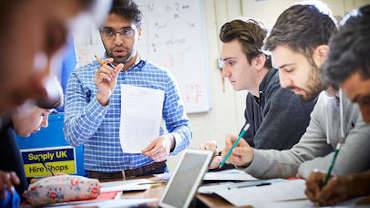Education for sustainable development
Education for sustainable development (ESD) is a vision of education which gives students the knowledge, skills, attitudes and values to become socially responsible global citizens and shape a sustainable future.
ESD covers the three pillars of sustainability – environmental, social and economic issues. At the University, we use the 17 United Nations Sustainable Development Goals (SDGs) as a framework for our ESD activities and we have mapped our academic contribution to each of the Goals. These Goals act as a blueprint to achieve a better and more sustainable future for all by 2030.
We have established a Working Group which aims to contribute to the advancement of higher educational curriculum and informal learning opportunities that will integrate learning for sustainability into, professional, academic and personal practice through partnership, innovation and the sharing of information. The Education for Sustainable Development Working Group feeds into the University's Education Committee and the Social and Environmental Impact Steering Group.
If you would like to find out more about the ESD, please get in touch (esd@le.ac.uk).
Teaching sustainability within our courses
 We believe that the development of sustainable development curricula, innovative learning and teaching practices are essential components in the discovery of solutions to global challenges and are necessary for preparing our students as members of a global community.
We believe that the development of sustainable development curricula, innovative learning and teaching practices are essential components in the discovery of solutions to global challenges and are necessary for preparing our students as members of a global community.
All undergraduate programmes have been asked to identify existing sustainability teaching, as part of the University's curriculum transformation project and the programme approval process. Academics have identified core and optional modules that have intended learning outcomes that align to one or more of the 17 SDGs.
Top five Sustainability Development Goals which most commonly feature in our modules are:
- Goal 3: Good health and wellbeing
- Goal 8: Decent work and economic growth
- Goal 9: Industry innovation and infrastructure
- Goal 10: Reduced inequalities
- Goal 16: Peace, justice and strong institutions
This work has identified that 100% of our undergraduate courses (2020/21 entry) have teaching aligned to the SDGs so the majority of our undergraduate students are learning about sustainable development as part of their courses. Each undergraduate course webpage provides which SDGs are included in the course's teaching. Along with the curriculum, there are extra-curricular opportunities and real life projects that students can get involved in to extend and enrich their sustainability knowledge and skills.
Sustainability in your course
The sustainability in your course documents were created to provide a visual representation of the SDG content in each course.
College of Life Sciences
College of Science and Engineering
College of Social Science, Arts and Humanities
- American Studies (PDF, 793kb)
- Ancient History and Archaeology (PDF, 795kb)
- Management (PDF, 794kb)
- Criminology (PDF, 792kb)
- English (PDF, 793kb)
- History (PDF, 798kb)
- History of Art and Film Studies (PDF, 795kb)
- Law (PDF, 800kb)
- Media and Communication (PDF, 795kb)
- Modern Languages (PDF, 801kb)
- Politics and International Relations (PDF, 798kb)
- Sociology (PDF, 791kb)
- Accounting and Finance (PDF, 777kb)
- Economics (PDF, 780kb)
Change for the better
As Citizens of Change, we have a huge obligation to address climate change by reducing our negative environmental impact and investing in positive social change. We actively encourage all our staff, students and visitors to do their bit by making sustainable choices everyday. To help achieve this, the University has a number of resources and initiatives available including our Sustainable Development Goals, carbon literacy training, low carbon work places and greener labs.
Living labs projects
We use a living lab approach to research real life sustainability problems through collaboration to make a real world impact.
This is an opportunity for students, academic staff, professional services staff and external stakeholders to work together on collaborative, interdisciplinary projects looking at real life sustainability problems within the University or local community – based around the UN Sustainable Development Goals. This approach allows research, education and operations to mix and work effectively together within the university to enhance sustainable development.
Students gain practical experience and undertake real life research that enables students to link theory to practice and gain professional, technical and employability skills. By encouraging collaboration with professional services departments, such as Estates and Campus Services, this helps to break silos and build positive relationships and community across the University.
Previous projects
Politics and International Relations BA students
As part of their 'Climate Change: Ethics, Issues, Justice' module, third year students in Politics and International Relations did group projects relating to climate change. Topics included; consumption of beef on campus, environmental impact of the Percy Gee building extension construction, food waste in Leicester and Leicester city's greenhouse gas emissions.
The projects aligned to the following Sustainable Development Goals:
- Goal 2: Zero Hunger
- Goal 11: Sustainable cities and communities
- Goal 12: Responsible consumption and production
- Goal 13: Climate action
Asha Mistry - Geography BA
Asha’s dissertation aimed to understand how the University of Leicester can influence a shift in student behaviours surrounding single-use plastics. She worked with the Social Impact Team, the Waste Manager and Enva, the University's waste contractor and provided recommendations and practical solutions to influence student behaviours.
This project aligned to the following Sustainability Development Goals:
James Boyd - Mathematics BSc
James developed a tool to calculate the total carbon absorption by trees on University sites. He completed this project as part of his Business Project module and worked with academics from the Mathematics and Geography department, the Social Impact Team, the Carbon and Energy Manager and the Gardens Manager to make sure his tool was accurate and useful. James won the Research with Impact (Student) Green Gown Award 2019 for this project.
This project aligned to the following Sustainability Development Goals: